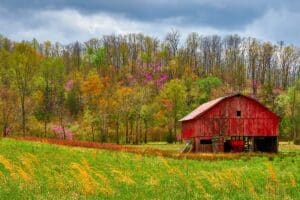J. Craig King, president and CEO of J.P. King Auction Company in Gadsden, Ala., believes that property auctions can help get rural real estate moving. His company reported that 2009 was its highest grossing year since 2006, with more than $50 million in sales in the fourth quarter alone.
King is a scheduled speaker at the first LANDTHINK Summit to be held at the Gwinnett Center in Duluth, Ga., on September 30, 2010. He is a fourth-generation president of the company and has 33 years of experience in the auction business. His company handles land, ranches, premier homes, developments and bank sales.
His unedited answers to my questions appear below:
1. If you were investing your personal money in land for a 10-15 year horizon, what type of would you buy? Do you prefer some locations to others? Why would you choose this type of land and location over alternatives?
I love recreational properties in transitional areas. A 10-15 year horizon allows for many lower-cost buying options in outlying locations. Southeastern timber/hunting properties are a great investment. With Alabama leading the way in outstanding deer and turkey populations, long hunting seasons and generous bag limits, Alabama properties are attractive to out-of-state hunters from adjoining states such as Florida, Tennessee, Georgia and Mississippi. I also like ranches in the Rocky Mountain areas with scenic views and hunting. In my opinion, these properties are currently beat down in prices, but they will recover and be an excellent long-term investment.
2. Do you think farmland and timberland are currently priced above, at or below market in terms of their intrinsic values (defined however you want), and why? What’s driving current valuations? Do you see a change in valuation drivers in the future?
In many areas of the country, farm and timber asking prices seem to be above current market values. Because many owners have not reduced asking prices, the number of transactions are off substantially, especially for the higher-value properties. This indicates to me the underlying values have gone down. In my home state of Alabama, we saw owners selling condominiums along the Gulf Coast in 2005-2006 and doing 1031 tax deferred exchanges into farm and timber properties in the Alabama Black Belt. This drove up prices that have since decreased. This was a valuation-driver I would not have anticipated. Now, I wish had a crystal ball so I could see what the next one will be and take advantage of it!
3. Do you use or recommend a general valuation formula for determining which investments to make, such as x% of farmland price in current or projected net cash annual income, or x% of acquisition cost in merchantable timber, or projected 10-year pay off of acquisition cost? Do you have non-revenue hurdles against which you measure land investment performance?
Most of the properties we handle at J. P. King are what I would describe as an asset purchase. We sell many one-of-a-kind properties. The owners expend substantial amounts on the property on an annual basis and make their money when they sell the property. We sell more emotional benefits to people who are interested in amenities such as hunting potential, scenic views, historical aspects, etc. While buyers want an underlying sound investment, they are making more emotional and less analytical purchases.
4. What nominal prices would you project for timberland currently fairly valued at $2,000/A and cropland at $2,500/A in 2025?
I have really not studied historic appreciation of the properties we sold 15 years ago. I would expect a 6-8% return would be a conservative estimate.
5. Do you anticipate any significant shifts in the market (either positive or negative) for agricultural products and timber fiber/logs during the next 15 years? Do you anticipate any technology change, shift in end uses, environmental issues, trade restrictions/expansion etc. that would positively or negatively affect current production trends and markets for agricultural and timber products?
I am really not familiar enough to venture an opinion on what future trends may be affecting these markets.
6. What trends do you see in land auction prices during the last 10 years? What are your expectations for auction prices for the next 10?
We saw much of the same run up in prices that followed the more general real estate markets. We saw strong demand for land — most all in the past decade through 2006 — with softness for the past 2-3 years. We expect this to continue in most areas, especially in transitional areas that, in the past, were absorbing some of the land for development. The recreational buyer is also on the side lines to a large degree for higher valued properties.
7. Taken as a whole, do you think buyers do better at land auctions than they would working through non-auction approaches? Do you think sellers do better at land auctions than they would through non-auction approaches?
As a 35-year real estate auction veteran, I feel there are strong benefits for both buyers and sellers with the auction process, especially in an uncertain real estate market as we are seeing today. Both buyers and sellers get an immediate reading on the market with the transparency of the auction process. For the buyer he knows he is not over paying for the property. He also can often purchase parcels of a property that best suits his needs that would not be available to him through ordinary sale processes. The seller can offer the property in parcels and often obtain a higher value for the property while selling all of the property in one day like a single transaction. He gets the best price for all of the parcels because typically the prices obtained for the parcels is greater than the total. As an example, imagine a 500 acre parcel with 350 acres of crop land and 150 acres of timber parceled up for sale by auction. The farmer only wants the crop land and would not put as high of value on the timber land as the timber investor or hunter. By parceling the property you get the farmers best price for the crop land and the best price for the timber land from the timber investor or hunter. Adjoining land owners can also compete for the parcels adjoining them. In the end, the property can also be offered as an entirety selling in the manner realizing the best overall price for the seller. With an auction, the real estate agent can stay involved in the transaction by referring the seller to an auctioneer or referring buyers to the auction so the sellers, buyers, real estate agents and auctioneers all benefit.
LANDTHINK.com is proud to host the first ever LANDTHINK Summit! This groundbreaking event will cover a variety of topics impacting the land industry, including market conditions and trends, recent legislation, conservation, creative financing, land market from a broker’s perspective, the timberland market and more. The Summit brings together industry experts, potential investors, and individuals and companies who own, sell, and invest in land. Summit attendees will gain access to some of the greatest and most valuable resources and thought leaders.
Join us September 30th at the Gwinnett Center in Atlanta, Georgia for a full day of industry education, information and networking with land industry experts and keynote speaker Coach Bobby Bowden. More information on the LANDTHINK Summit can be found at GetLandSmart.com.
This content may not be used or reproduced in any manner whatsoever, in part or in whole, without written permission of LANDTHINK. Use of this content without permission is a violation of federal copyright law. The articles, posts, comments, opinions and information provided by LANDTHINK are for informational and research purposes only and DOES NOT substitute or coincide with the advice of an attorney, accountant, real estate broker or any other licensed real estate professional. LANDTHINK strongly advises visitors and readers to seek their own professional guidance and advice related to buying, investing in or selling real estate.










Add Comment